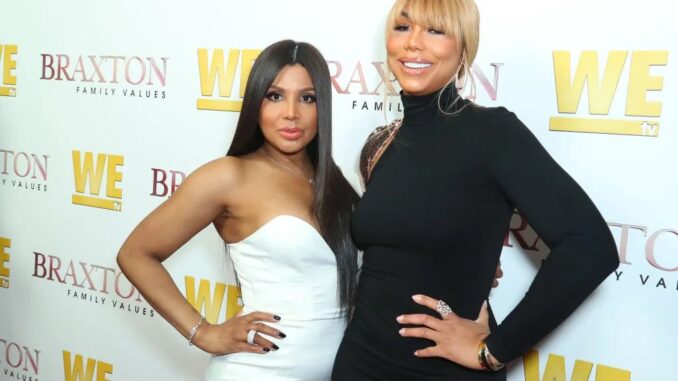
Reality TV star Towanda Braxton reportedly voiced her frustrations to WEtv producers after learning that her sisters, Tamar and Toni Braxton, were receiving significantly higher pay for the revamped series of The Braxtons. According to insiders, Towanda felt strongly that the entire cast should have been compensated equally, especially given her claim that she was filming more scenes and essentially carrying a larger share of the show’s content.
Sources suggest that Towanda revealed she only received $250,000 for her role in the series—before taxes—while Tamar and Toni reportedly secured much higher payouts. The disparity has sparked conversations among fans and entertainment insiders alike, raising questions about fairness, negotiations, and the business realities of reality television.
The situation appears to stem from differing negotiation strategies among the sisters. Reports claim Tamar hired a lawyer to negotiate her return to the show, ensuring that her compensation reflected her star power and contribution. Similarly, Toni negotiated her compensation independently. Towanda, by contrast, accepted the contract offered to her, which may explain the discrepancy in pay.
Fans have taken to social media to debate whether Towanda’s complaints are valid. Some argue that if she is contributing more screen time and content to the show, she deserves equitable pay. Others counter that reality TV is a business, and each star’s compensation often reflects marketability, prior fame, and negotiation skills rather than equal workload.
Entertainment analyst Jane Simmons commented, “This isn’t uncommon in reality television. Often, long-running stars or those with higher name recognition command bigger salaries, even if another cast member does more work on a day-to-day basis. Towanda’s frustration is understandable, but negotiations play a huge role in how these deals are structured.”
Towanda’s revelation comes at a time when fans are already invested in the dynamics of The Braxtons. The show, which follows the famous musical family, has seen multiple revamps and cast changes over the years. With Tamar and Toni being household names due to their individual music careers, it’s perhaps unsurprising that their compensation might be higher. However, Towanda’s larger on-screen presence and claims of carrying more of the show spotlight a tension between fame and workload.
Some viewers sympathize with Towanda, pointing out that reality TV stars often endure grueling filming schedules, personal exposure, and public scrutiny, which arguably warrants fair compensation for everyone involved. Others argue that each person’s contract reflects what they agreed to, and accepting a deal is part of the business.
Towanda’s concerns also shed light on broader conversations about pay equity in the entertainment industry, particularly for reality television stars who may not have the same bargaining power as music or acting icons. The issue of who gets paid what has long been a source of controversy, from scripted series to reality programming, and fans are increasingly vocal about calling out perceived disparities.
For now, WEtv has not released an official statement addressing Towanda’s claims. However, this controversy has already generated significant buzz online, as viewers debate whether Towanda is right to demand equal pay—or if this is simply a reflection of the business realities of television production.
In the end, this story serves as a reminder of the complex interplay between fame, negotiation, and compensation in reality TV. While Tamar and Toni leveraged their star power to secure higher pay, Towanda’s outspoken stance may inspire further discussions about fairness and transparency in the industry—and could even influence how future reality stars negotiate their contracts.
